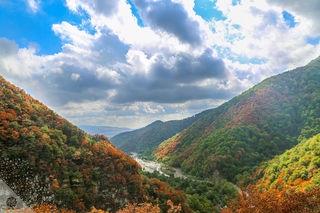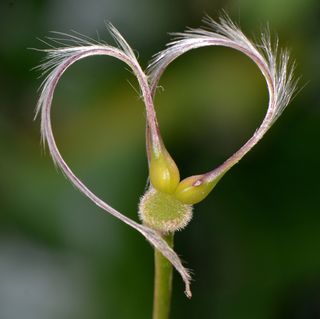Environment
Eutierria: Becoming One With Nature
Eutierria can be an antidote to alienation, from nature and society both.
Posted July 3, 2016 Reviewed by Ekua Hagan

In a previous post, I discussed a few terms collected and invented by the Australian sustainability professor Glenn Albrecht that may help reorient modernity’s approach to the rest of nature.
Today, I’d like to add another of Albrecht’s terms to the discussion—eutierria: “a good and positive feeling of oneness with the earth and its life forces.” It arises when “the human-nature relationship is spontaneous and mutually enriching (symbiotic).” [1] (The prefix eu comes from the Greek word for “good”; the root tierra means Earth.)
Eutierria refers to secular experiences but echoes the “oceanic” feeling identified in various world religious traditions. When it occurs, your perception of the boundaries between yourself and all else—the thoughts and feelings setting you off from the rest of the cosmos—seem to evaporate. The distinction between you and nature (or in the religious versions nature and God) breaks down. You become one with the universe. A reassuring sense of harmony and connection with the world infuses your consciousness. It’s an experience that matches up with the knowledge of your own dependence on and connection to the world.
How might you experience eutierria? Perhaps you already have. One way might be going deep into nature, using all your senses to hear, see, smell, feel, and even taste the engulfing and enriching natural world in all its depth and splendor, creating a moment when the sensing mind quiets and overtakes the thinking mind. I believe under such conditions, it’s actually rather easy to forget the self and instead become so wrapped up in sensing that ironically you, the sensor, disappear into the sensuous world of nature.
Experience of the Totality
A Mexican composer once asked students, including me, in his music composition course, “Can you see the past?” He meant it literally—can you see right now what has happened in the chronological past? Consider taking a moment now to think about this question before you read on.
After we all scratched our heads and thought hard, exhibiting a lot of skepticism as if it were some kind of new-age trick, our professor did enlighten us. "Look up at the nighttime sky," he said, "and see the stars. The light reaching your eyes was emitted thousands or millions of years ago. Some of those stars you are 'seeing' no longer exist. You are seeing—sensing—the past. Even the light from the nearby moon takes more than a second to reach your eye after reflecting off that heavenly body."
This phenomenon applies, of course, to everything you sense, though usually to a much smaller degree. You notice it when you see a firework explode then hear it after a short delay. Different sensory stimuli—evidence of the outside world—reach you at different speeds. Plus, your body takes some time to propagate and process all sensory stimuli. In essence, everything you sense is in the past, and your perception of “the present” is something your mind constructs by pulling together all sorts of different stimuli that have happened at possibly (very slightly or hugely, in the case of the stars) different times, creating something like a sensory “whole” from them.
Consider for a moment what this all means for identity and personhood. Each person is always living in a precise and unique position and moment. Nobody else receives all the same perceptual stimuli as you because you’re always at different positions on the planet, in the universe. That is, you exist at a unique juncture in the world and thus absorb a unique trajectory of sensory experiences that exactly match nobody else’s.
On the face of it, this understanding of the basic sensory “subjectivity” of all people (and animals, and perhaps even plants, as I write here) seems a bit lonely. We cannot fully observe everything anyone else does. So we are each alone in the world.

Back to Oneness, But With Distinction
Suddenly, it seems that I’ve landed at a conclusion diametrically opposed to the one I set out to discuss. Eutierria helps us transgress our individualistic, isolated experience of the world by feeling we are one with all nature, even when we arrive at it through intensely focused sensory experience. Yet our senses at the same time separate us from others since they locate us at a particular spot in the lifeworld that’s (at least slightly) different from everyone else’s.
Instead what we have is a paradox: the senses both join us with the cosmos and all of nature and humanity and help make us into individual persons.
This simultaneous oneness and separateness, and the tension between the two, is a key point in environmental philosophy and psychology. We must identify with other people, animals, and nature as a whole—we have to see that we exist in utter interdependence with them and share most of our qualities with them—to have the greatest motivation for caring for these others, for adopting their welfare as our own.
At the same time, we must acknowledge and accept their separateness from us, their individuality, their own wholeness, because we might otherwise simply impose our own needs or will upon them, as the renowned ecofeminist environmental philosopher Val Plumwood observes in her book Environmental Culture. [2] We must take care to relate to others with respect for their needs as they express them.
We are both separate and one—neither standpoint by itself will do.

Let me conclude by noting that experiences of eutierria can be a powerful antidote to the over-separateness of our modern world. The rise of individualism over communitarianism and conceptions of the unity of nature in the West from early modern times, as I write in my book Invisible Nature, has left us with feelings and experiences of alienation from nature and lots of social alienation as well.[3] By placing the individual at the center of concern rather than the whole community of life, modernity can create loneliness. Seeking out eutierria can help heal the divide.
Check out my book Invisible Nature and read more of my posts at The Green Mind.
References
[1] Glenn Albrecht, “Psychoterratic Conditions in a Scientific and Technological World,” in Jr, P. H. K., & Hasbach, P. H. (Eds.). (2012). Ecopsychology: Science, Totems, and the Technological Species. Cambridge, Mass: The MIT Press. Citations to the origins of the terms not invented by Albrecht can be found in his text.
[2] Plumwood, Val. Environmental Culture: The Ecological Crisis of Reason. New York: Routledge, 2001.
[3] Worthy, Kenneth. Invisible Nature: Healing the Destructive Divide between People and the Environment. Amherst, New York: Prometheus Books, 2013.




